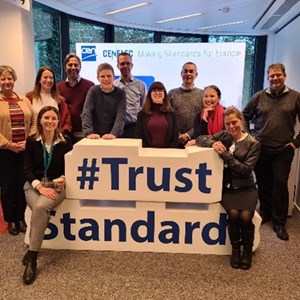NEWS

ANEC is delighted to have agreed on a Memorandum of Understanding (MoU) with The Hague University of Applied Sciences (THUAS), related to the university’s International and European Law Programme.

The European Commission standardization request in support of EU policy on artificial intelligence (European Commission C (2023)3215), issued in May 2023, requires facilitating an appropriate representation and effective participation of relevant stakeholders in the development of the standards mandated to support the AI Act.

In January, SBS published two position papers outlining its recommendations to ensure the interests and growth of small and medium-sized enterprises (SMEs) in standardization at the national and international levels. The objective of the publications is to strengthen the participation, role and impact of SMEs and SME experts in the national and international standardization systems.

For 100 years, Finland has used standards to promote competitiveness, the functioning of society, public safety, and national security.

Global standards on the quality and safety of condoms and IUDs have been around for a long time. However, even though about 1.8 billion of the world’s girls and women menstruate every month, there are no standards on menstrual products.

We are already well into the second month of 2024, and at SIST, the Slovenian Institute for Standardization, we are sure that all national standardization bodies have already started their activities too. Some of SIST’s work is just the continuation of previously launched tasks which will be taken to the next level in 2024. However, there are also some brand-new projects that we are looking forward to.

EDU4Standards.eu is a brand-new research project funded by the Horizon Europe programme under Grant Agreement No. 101135705. CEN is partner in the EDU4Standards.eu, which is led by Fraunhofer-Gesellschaft and brings together key players in education on standardization in Europe, including 11 university partners from across Europe.

In a world rapidly transitioning towards a greener and more digital society, the development of digital technologies and related policies has taken centre stage. Acknowledging the pivotal role of standardization in realizing its objectives, the European Union is committed to boosting the development and adoption of global digital standards for increased competitiveness.


On 18-19 January 2024, CEN and CENELEC in Brussels hosted the kick-off meeting of the Horizon Europe Project RISERS: A Roadmap for Industrial Symbiosis Standardization for Efficient Resource Sharing. This three-year initiative will pave the way to develop standards that support building symbiotic collaborations among industries and sectors that allow keeping resources in productive use for longer.